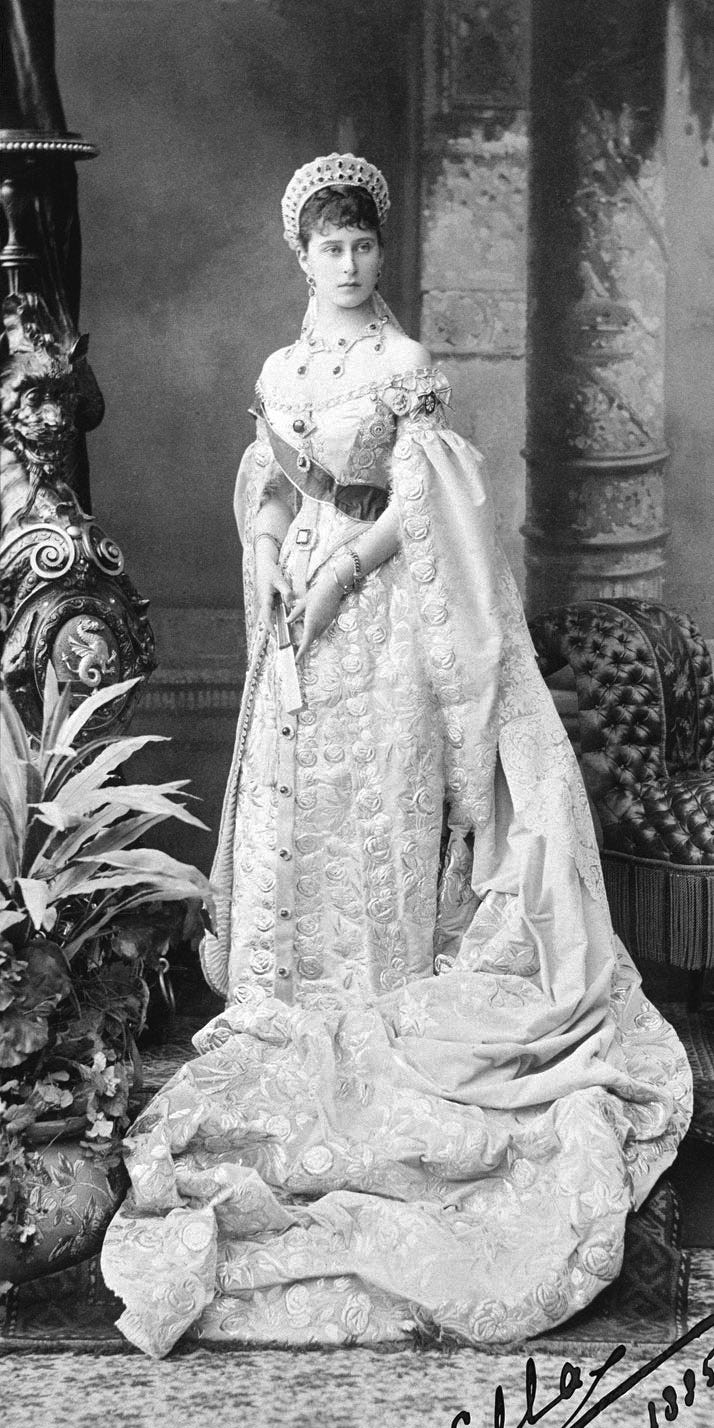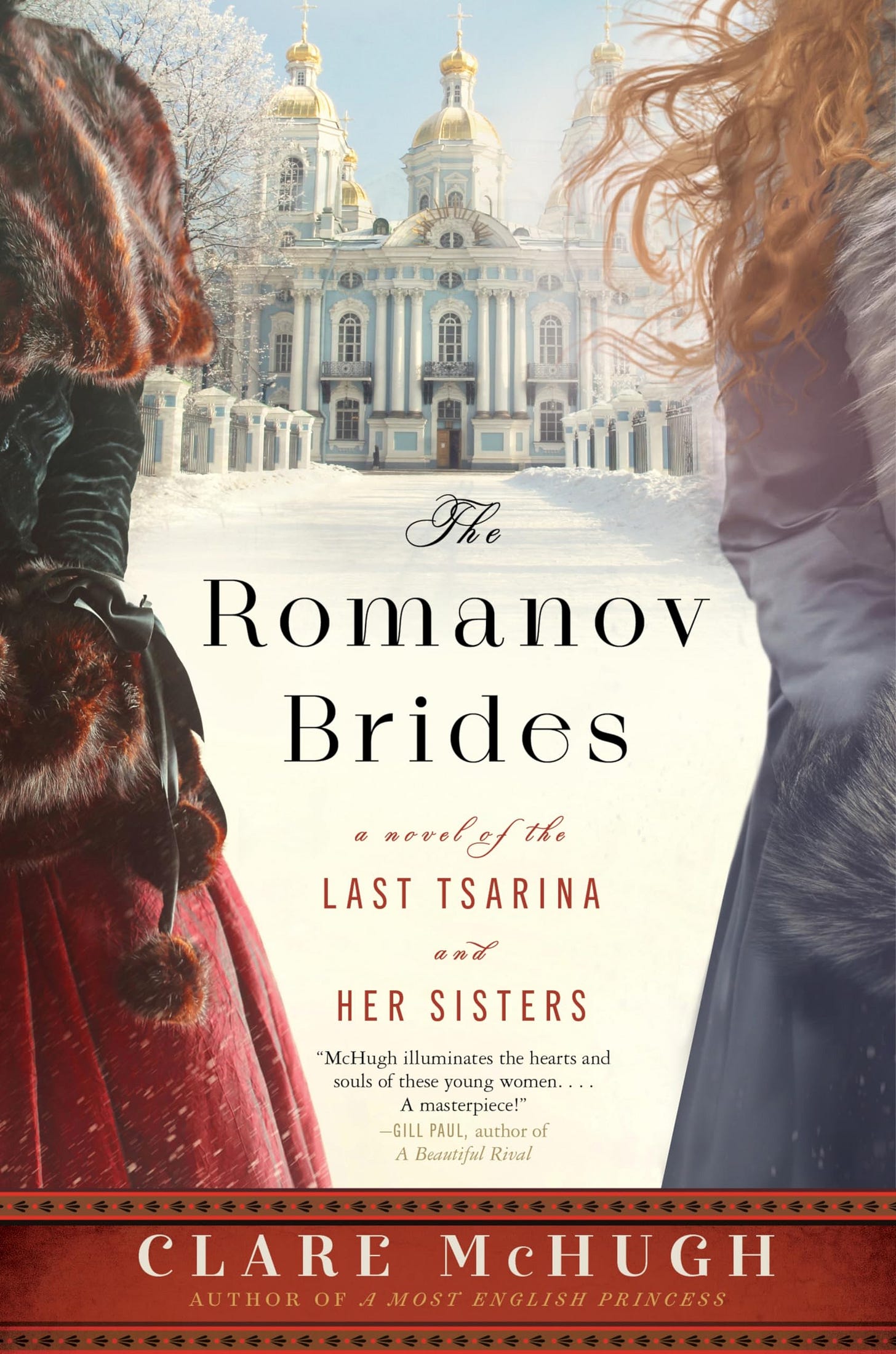Book Review: "The Romanov Brides" by Clare McHugh
A deeply evocative novel about Elisabeth & Alix of Hesse, the two Anglo-German princesses who married into Russia's last dynasty.
Clare McHugh’s The Romanov Brides offers a vivid reimagining of these sisters and the struggles they faced as they acclimated to an often unforgiving social, political, and meteorological climate in the preamble to the Bolshevik Revolution.
In the late-19th century, two beautiful Anglo-German princesses - Alix of Hesse and Elisabeth of Hesse - married into the Russian imperial family, the Romanovs. For all of the glittering halls, towering spires, and decadent pageantry of the Imperial Court, however, there coursed an undercurrent of secrets; political, social, and economic instability; interfamilial tensions; and a firm and rigid belief in the inviolability of nobility ill at ease with the general populace. Clare McHugh’s The Romanov Brides offers a vivid reimagining of these sisters and the struggles they faced as they acclimated to an often unforgiving social, political, and meteorological climate in the preamble to the Bolshevik Revolution.
Synopsis
The story begins with the Hesse children in their youth. Ludwig IV of Hesse and by Rhine and his wife Princess Alice of the United Kingdom, daughter of Queen Victoria and the late Prince Albert. The children consist of Victoria, Elisabeth (Ella), Ernest, May, and Alix. Sadly May and Alice succumb to illness and pass away, leaving Ludwig to care for his family.
Kind and gentle Elisabeth takes on a matronly role, caring for her father and her younger siblings. Alix, shy and stubborn, struggles with the death of her mother and playmate and retreats inward, a characteristic she keeps well into adulthood. Both remain strongly attached to their family, even as their intrigue with their Russian relatives grows when the Romanovs visit their home in Darmstadt.
Ella marries Grand Duke Serge Alexandrovich, her father's kin and uncle to the future tsar Nicholas II. He's rigid, precise, and meticulous, and places his wife on a pedestal for all to admire like a priceless porcelain doll. The Grand Duchess struggles to find happiness in her marriage. After a trip to Jerusalem, however, Ella finds comfort in her faith and acceptance in her situation.

Alix falls in love with and eventually marries Nicholas Alexandrovich, Serge’s nephew and the Romanov heir. Though she admires the trappings and pageantry of the Imperial Court, Alix grapples with finding her footing among the Russian nobility. Her quiet and reticent personality makes her few friends. Unlike Elisabeth, though, Alix finds joy and love in her relationship. But will it be enough? Could it ever be enough?

The road to happiness is hardly easy, and both Elisabeth and Alix must contend with their familial duties and pressure, especially from their formidable grandmother. But, ultimately, they choose to chase their fortunes in far Russia, to whichever end.
Review
The Romanov Brides authentically and evocatively plunges readers into the complex tangle of 19th- and early 20th-century English, German, and Russian politics. Though many familiar with Romanov history know the story's finale, McHugh grants us a chance to engage in a period of suspended disbelief as we experience Elisabeth’s and Alix’s lives and loves.
And yet, it's clear the author remains true to the facts. From childhood nicknames to tiny facets of Alix’s and Nicholas’s blooming relationship (such as when they carved their initials into a windowpane), McHugh suffuses the novel with deep historical knowledge as she draws from a well of sources. Though the story’s perspectives primarily focus on Ella and Alix, she occasionally drops in viewpoints from related characters such as Countess Alexandra Vorontsova-Dashkov, a friend of the Imperial family, often based on their own memoirs. It’s an intriguing way to interpret and present primary source material in a fictional way.
We know how Alix’s and Ella’s stories end: sadly, they both fall victim to the Bolshevik purge of the Romanovs in July 1918. It's easy to romanticize the downfall of the Romanov dynasty, with the brutal executions of Czar Nicholas, his wife Alix (called Alexandra in Russia), their children, their servants, and other Romanov family members. And I for one decry the act as deplorable. As such, it's tempting to see the Bolsheviks as “the bad guys”.
But McHugh's fictional treatment of their lives before these tragic moments compel us to confront both sides of the revolution and probe them to understand that while we may sympathize with the Hesse sisters’ deaths, we should also recognize the Romanovs weren't wholly innocent. Nicholas, Alix, and many of the Romanov firmly believed in the concept of the divine monarch, a view at odds with their people. This kept them in an ivory tower above the commoners and bred resentment that, in part, fueled the Bolshevik Revolution.
History is not so black-and-white; its obscure fog tangles together these sides into a complex and complicated web of politics, society, economics, and religion. McHugh's The Romanov Brides does not romanticize Alix and Elisabeth's lives, and rightly so. She gives them flaws and traces their motivations, hopes, and ambitions. She humanizes these sisters in a very distinct and authentic way.
On the whole, The Romanov Brides captures the beauty and drama of these Romanov ladies. Although the book ended a bit abruptly for my liking, readers can expect a well-rounded treatment of them, one that may leave them mourning what could have been.
I’m grateful to the author and publisher for a copy of this book via NetGalley!
Book Summary
Title: The Romanov Brides
Author: Clare McHugh
Publisher: William Morrow Paperbacks
Publication Year: March 2024
Page Count: 384pp
If you’re looking for a similar book about powerful women, check out my review on Keira Morgan’s novel The Importance of Wives, a novel about Anne of Brittany!
Book Review: "The Importance of Wives" by Keira Morgan
Keira Morgan’s The Importance of Wives delivers a powerful story about Anne of Brittany, a fifteenth-century noblewoman and duchess who later became Queen of France. Immensely detailed and engaging, the novel explores the complex nature of French medieval politics and those who chose to stand against French annexation.
If you enjoy this content, please consider buying me a coffee…or a pint…or a new book! Your support helps keep Musings of a Bookish Historian going and means the world to me. Thank you!
Featured image: Grand Duchess Elizabeth Feodorovna in court dress, Charles Bergamasco, gelatin silver print, 1885 (Royal Collection Trust, RCIN 2927236)









Another great review, Amy!